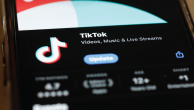Analysis of findings
Riveting events
Americans were deeply affected by the terror strikes on the World Trade Center and the Pentagon on September 11. In the first days after the attacks, the nation was engrossed in the rescue effort, the investigation, and the stories that emerged from the attacks themselves. This meant that some people actually stayed off line as they watched TV and tried to absorb the enormity of what happened. It also meant that much of the “normal” online activity dropped significantly as people flocked to news sites, sent and read email related to the attacks, and visited virtual places where they could discuss the events and their aftermath.
In the days after the attack the number of people using the Internet fell, as did the number of people sending and reading email
The overall size of the online population of Americans was down in the days following the attack. About 51% of U.S. Internet users were online during a typical day during the period between September 12-19, compared to 56% during the days of the late summer and 59% of Internet users during February 2001.
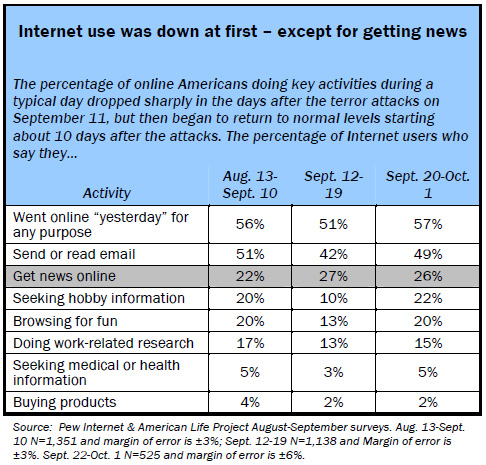
Similarly, the overall use of email was substantially lower. In the days after the attack, 42% of Internet users were sending or reading email, compared to a typical day in August, when 51% of Internet users were sending or reading email, and compared to a typical day in February, when 53% of Internet users were sending or reading email. Even the heaviest users of the Internet, the truly wired cohort who usually go online every day and have plenty of Internet experience, were not quite as fervid in their use of the Internet in the days just after the attacks.
And these highly wired Americans were also using email a bit less. On any given day in February, our survey shows that 82% of the heaviest users of the Internet send or read email. That compares to the 71% who were sending and reading email on an average day during the period from September 12-19.
ComScore Network’s traffic data illustrate that overall usage was down, but that the people using the Internet were surfing aggressively
On September 11, the Internet traffic-analysis firm found that 130 million people around the world used the Internet, down 18% from 159 million users on the immediately preceding Tuesday, presumably reflecting heavy TV viewing of the events of the day.
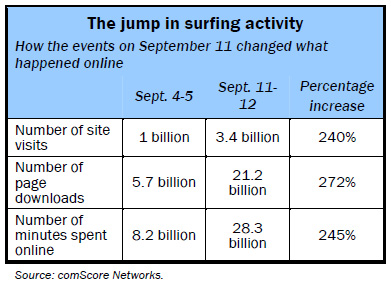
Online shopping dropped 58% in dollar sales, according to comScore.
However, among those who did use the Internet for information gathering, usage levels surged dramatically along every metric. The number of sites visited by those online more than doubled, as did the number of page downloads and the number of minutes spent online by those who had logged on.
The rise in Internet use for getting news
Many more people than usual were seeking news on the Internet in the days following the attacks. Pew Internet Project surveys show that on an average day online in the four weeks before the terror attacks, 22% of Internet users got some kind of news, often by chancing upon news items while they are browsing or doing other activities on Web sites. On the day of the attack, 28% of Internet users were getting news and in the period of September 12-19, 27% were getting news on a typical day.
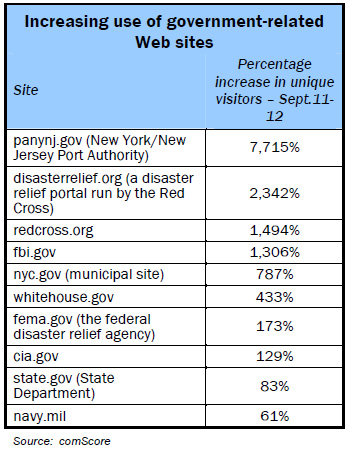
Overall, 50% of Internet users, or about 53 million people, went online looking for news about the attacks and the aftermath at some point in the first three weeks after attacks. As always, more online men were news consumers than women. Some 57% of men with Internet access sought news about the attacks and the aftermath, compared to 43% of women. By comparison, women were more likely than men to have sent emails to family and friends about the assaults.
Some have exploited personal news networks – their own cadre of online experts and group or community Web sites – to get more information and explore policy options.
Dan Hess of comScore reports there was a huge spike in international traffic to U.S.-based news Web sites in the days right after the attacks. That helps explain the remarkable increase in their usage. ComScore data show that on September 11 and 12 traffic to cnn.com grew 680% to 11.7 million unique visitors, traffic to msnbc.com grew 236% to 9.5 million unique visitors; traffic to cbs.com grew 819% to 1.7 million unique visitors, traffic to nytimes.com grew 206% to 1.7 million unique visitors, traffic to washingtonpost.com grew 225% to 1.2 million unique visitors, and traffic to usatoday.com grew 174% to 1.1 million unique visitors.
Similarly, comScore found there was enormous growth in visitors to some government-related Web sites. (See table on page 8.)
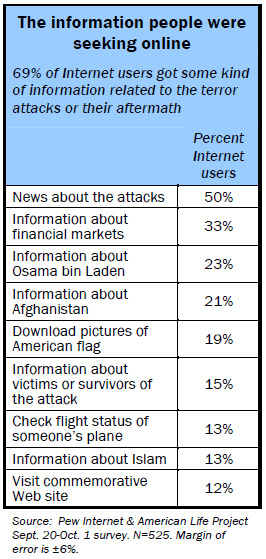
Moreover, a significant number of Internet users went “on alert” via the Internet to make sure that breaking developments in the story were quickly transmitted to them. Some 15% of online Americans got audio or video versions of newscasts streamed to their desktops and 7% of Internet users signed up to get news alerts about the continuing coverage of the attacks and their aftermath.
Generally, people went to specific news sites with which they were familiar. Some 58% of online Americans did that. But more than a quarter of Internet users turned to search engines to dig for information; 23% used search engines to track down the information they wanted and 6% reported that they went to both search engines and news sites to get material.
Fewer people used the Internet for fun activities or for things unrelated to news right after the attack
In the aftermath of the attacks, there were considerably fewer Internet users going online to do things unrelated to getting news or using email to communicate. The number of people getting hobby news on a typical day between September 12-19 dropped by 50%; the number buying products online fell 50%; the number seeking medical information fell by 40%; the number browsing the Web just for fun dropped by 35%; and the number doing work-related research fell by 24%.
Still, there were important distinctions to note among different types of Internet users. Veterans used the Internet with much higher intensity than newcomers in the aftermath of the terror attacks. Those with a year or less of experience were the most likely to log on less frequently right after the attacks.
This is part of a larger trend. Many newcomers report that they are using the Internet less now than they were six months ago because they do not have enough time. In contrast, many veterans report they are using the Internet more than they did six months ago because they are doing more research, and in all likelihood devoting their time online to gathering news and information about the terror attacks.
Signs of the return to normalcy online
In the final week of September, a period before the U.S. retaliatory bombing against the Taliban regime in Afghanistan, patterns of Internet use were returning to average levels. In the period between September 20 and October 1, 57% of Internet users were online on a typical day. The number of people sending and reading email on any given day use had risen, too. Between September 20 and October 1, 49% of Internet users were handling email.
Television was the primary news source and the telephone was the primary communications tool even for Internet users
Nearly all Americans, including Internet users, relied on television for news and the telephone for their urgent communications in the period right after the attack. Fully 79% of all Americans say that television was the source of most of their news – and 80% of Internet users report the same thing.
The figures are hardly different even for the most fervent Net users. Just 6% of the most wired Americans (those online for more than three years and who log on from home every day) say the Internet was the place they got most of their news.
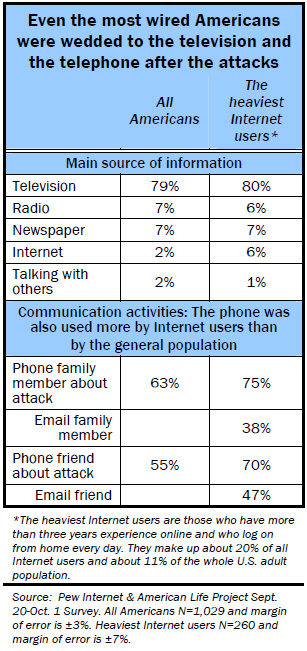
These highly wired Americans were also just as likely as their offline peers to say they were getting most of their information from radio sources and from newspapers.
On the communications side, 63% of all Americans called a family member in the days following the attack and 55% called a friend. That compares to 30% of Internet users who sent emails to family members and 36% of Internet users who sent emails to friends about the attacks.
Some 13% of Internet users sent instant messages to others about the attacks.
America’s virtual commons
A third of Internet users posted or read comments about the attacks on a Web site bulletin board, in a chat room, or on an email listserv. The vast majority read material, rather than contributing their thoughts. Some 28% of Internet users were observers on the virtual commons; 5% of Internet users said they posted to such communities. Men were more likely than women to have written something in such places; and young Internet users (those ages 18-29) were by far the most likely to have read what others had said.
Asked about the discussions that were unfolding on bulletin boards, in chat rooms, and on email lists, 46% said the postings were mostly about how the U.S. should respond to the attacks, 22% said they were mostly about consoling those who were sad about the attacks, and 19% said they were mostly about ways people can personally deal with the attacks in their communities.
Asked to judge the nature of the online discussions they observed, most said they were civil rather than angry (57% vs. 37%), rational rather than heated (72% vs. 21%), and focused mostly on people rather than policy (57% vs. 35%).
Case studies from the commons
The Pew Internet & American Life Project monitored several online discussion sites in the days following the attacks, including 2,452 postings to the Yahoo September 11 bulletin board, 298 postings to the Beliefnet’s After 911 channel, thousands of postings to Goggle’s soc.culture.Afghanistan community, 23 postings to the International Women’s Forum, and 2,009 postings to the Well filed in the Current Events section.1 There were thousands of other comments in the Well in other sections and we examined a random number of them.
We found that there was a huge amount of activity at these sites after the attacks. The discussion often followed a pattern. The early postings on September 11 spoke of members’ shock and disbelief. Many were like this one from Tori Hill in Yahoo’s group: “This is absolute chaos… a sheer tragedy…how could this happen here?” Others reacted with fear and anger, such as this member of the Well: “I have numerous friends and business associates who work in the WTC complex. We are devastated. I want blood, now.”
Since the telecommunication systems both in New York and Washington were overloaded that day, many could not reach friends on their phones and turned to the Internet in search of information on them. Online communities seemed to be an important source of information, according to some of the Well members. “People, please keep these reports coming,” wrote one. “I have friends in New York but right now this is my only source of information. All the news sites are totally jammed.” Others however, decided to turn off their computers: “This is definitely a case where online sources are going to lag well behind TV. It’s on all the major channels. I think all Americans should be let out of work/school to watch; it’s major history. What I mean is that this is one of those times to abandon your computer and go turn on a TV. Any TV.”
Online communities were also places where people from different countries could come together and mourn. Messages of condolence came from the Philippines, Turkey, Sweden and Great Britain to the Yahoo site: “From the Philippines, we are shocked and angry at how innocent lives can be lost in this way. We can only sympathize.”
At Beliefnet, a member was so emotionally and spiritually stricken by the attack that he decided to leave the group all together: “I don’t know what I believe anymore. I am not even sure how I feel about God. I use to believe all things happen for a reason but have since decided that is an idiotic way to believe…I have decided to leave Beliefnet for a while and think things out. I have been a member nearly a year and met some pretty wonderful people. I will miss you all.”
Others expressed appreciation for Beliefnet’s site: “I can’t seem to find happiness in my everyday life like I could before Sept 11. It really sucks…. Thanks for this topic, I guess I need to express my feelings and here is a good place to do just that.”
After the shock and anger came another wave of postings. Many included links on how to contribute, where to give blood, how to make donations to relief organizations, first-person accounts, and suggestions on books to read. Lots of members pasted links in their messages to useful newspaper articles.
[President Bush]
Eventually, criticism arose. Challenges to America’s foreign policy were raised on most of the sites, like this posting on Google: “What’s the difference between Osama Bin Laden killing thousands of innocent Americans in New York city by bombs, and George Bush killing thousands of innocent Iraqis in Baghdad by sanctions?” Others there had the opposite opinion: “Each terrorist should be executed by a firing squad. Each bullet should be dipped in hog fat.”
Towards the end of September, the online community postings took another turn as the nation awaited the U.S. retaliation. Many focused on information related to Islam, Afghanistan, Pakistan, other countries in the Middle East, and evaluations of American foreign policy. One Well member asked: “Could we really win a war against the billion people of Islam spread all over the globe?” The reply she/he got was: “Without question. What are they gonna do, throw rocks at our Cruise Missiles?”
Then, people began to discuss the fate of U.S. troops. “We’d really better train our folks in the Rockies,” said one writer at the Well. “I think they’re the only mountains that even compare.” Another suggested “training a little closer to the action and actual climate. Pakistan, Uzbekistan, Tajikistan, etc., are granting us permission to base our forces on their territory and I’d bet folding money our special forces are undergoing rigorous training in undisclosed locations in those countries as we speak.”
Email content
Another trove of communitarian activity was the email exchanges people had with their family, friends, and colleagues.
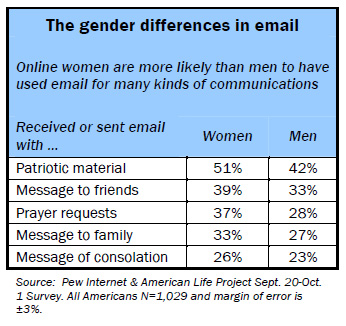
In addition to checking in with family and friends, here are some of the other findings from our survey about the ways in which email was used:
- 46% of Internet users received or sent patriotic material by email.
- 33% of Internet users received or sent email prayer requests.
- 25% of Internet users received or sent email messages of consolation.
- 12% of Internet users sent emails to people they had not spoken to in years.
- 10% of Internet users got emails from people they had not spoken to in several years.
- 9% of Internet users received or sent accounts of survivors or victims.
- 2% of Internet users of Internet received email with hate material in it.
Trouble placing calls and using the Web
About a third of all Americans (32%) had some trouble placing phone calls on September 11 and about one-eighth of them turned to the Internet to make contact with loved ones and friends.
At the same time, 43% of Internet users say they had at least some trouble accessing the Web sites they wanted to consult for news about the attacks – 15% of Internet users say they had a lot of trouble in the first hours getting to a Web site. Of those who had difficulty 40% eventually reached the site they had tried at first and another 39% went to other sites to seek information about the attacks. But a fifth of those who had trouble simply gave up on using the Internet to get news about the attacks.
An overall assessment of the role of the Internet
A modest number of online Americans say they found the Internet useful in the aftermath of the attacks. In all, about half of Internet users (47%) said they got at least some modest benefit from their use of online tools. Some 34% said the Internet helped them learn more about what was going on and 30% said it helped them connect to people they needed to reach. Online men were more likely than online women to cite the benefits of the Internet for getting news about the terror strikes.
However, most of the people who actually used the Internet to gather news and contact key family and friends had a positive assessment of the role of the Internet in their lives following September 11. For instance, 67% of those who went to news Web sites for material about the attacks said the Internet helped them learn more about what was going on. Similarly, 70% of those who emailed family members about the attack and 66% of those who emailed friends said the Internet helped them connect with people they needed to reach. And more than three-quarters of those who got news online or exchanged email about the assaults gave some kind of positive assessment about the role of the Internet in their communication or information-gathering.
Individual Americans respond to the attacks
In the first nine days after the attacks 40% of all American adults, about 76 million people, say they flew or displayed American flags; 32% (or about 61 million people) gave money to relief efforts; 12% tried to donate blood, and 12% attended meetings to discuss the attacks and their aftermath. According to the survey respondents we reached from Sunday, Sept. 16 through September 19, 40% of American adults attended a religious service in response to the attacks.
Some of Internet users who personally responded to the crisis said they learned about how to respond via an Internet source. For instance, 9% of Internet users who went to meetings after the attack learned about the gatherings on the Internet; 8% of the Internet users who tried to donate blood were inspired by an item they read online; 7% of the Internet users who went to a religious service say they learned of that service online; and 5% of those who donated money learned about organizations receiving contributions from the Internet.
Cancelled or postponed travel plans
Some 11% of Americans – more than 19 million people – say they cancelled or postponed travel plans after the terror assault. Those in households earning more than $75,000 and those with college educations were the most likely to have done this.
How people first learned about the attacks
Asked how they first heard of the attacks, about two-thirds of Americans heard from traditional electronic news media sources, TV and radio, and about a third (31%) heard about the assaults in conversation.
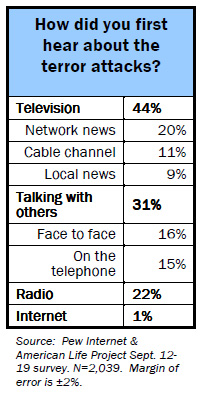
The figure for conversational exchange is remarkably high, possibly because the attacks took place during a time of day when many people were just congregating at their work places and probably because of the magnitude of the news. Half of those who heard about the attacks from other people heard it in a telephone call and it is likely the case that those conversations were shocked exchanges of the news. It was the kind of story that many people needed to bring to others’ attention and needed to discuss with others right away.


